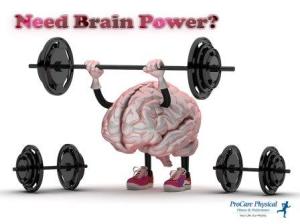In a previous blog I wrote, I talked about a study done at Purdue University. The results showed that students who went to the gym more often had higher GPAs then those who did not go to the gym. I did not find the study to be accurate but there is still a possibility that exercising can effect our intelligence. I wanted to further my research for my previous blog because I was debating if I should go to the gym more since finals are approaching and I found an interesting study done about whether exercise makes us smarter or not.
Most studies that measure exercise and intelligence look for correlations between exercising and an improvement on memory and thinking skills. However, the study that I researched tests to find if the relationship between exercise and cognitive benefits is real or undergoes the placebo effect. The scientists that created the experiment wanted to test the placebo effect on exercising. A placebo is, “a substance containing no medication and prescribed or given to reinforce a patient’s expectation to get well” (The Free Dictionary). Successful studies consist of randomized control trials with a control group receiving the placebo. However, there is no placebo for exercise because the participants are going to be aware if they are exercising or not.
According to the New York Times, scientists came up with a way to test a placebo in the exercise study. They surveyed 171 people online. Half of the participants were asked to estimate how much of an effect a stretching and toning program would have on their thinking skills and the other half was asked to estimate how a walking program would effect their thinking skills. The results showed that the participants thought that stretching and toning would have a greater impact on improving cognitive skills than walking would. Studies show that walking has the bigger impact on improving cognitive skills. Since this particular study did not involve any exercise, the only conclusion that scientists can make is that the benefits of aerobic exercise are real and are not due to the placebo effect.
I found this study to be very interesting. I agree with the final outcome that the scientists discovered and I believe that the relationship between any exercise and intelligence is real as well. It is very difficult to prove this theory since there is no placebo for exercising but I think with further studies done it can eventually be proven. The size of the study concerned me a bit. Accurate studies usually have a larger number of participants but I think that 171 participants is a fair amount of people.
Reverse causation can be ruled out of this study because no actual exercise is being done. If exercise was being done than there could be a possible reverse causality such as smarter people exercise more. However, this study consisted only of a survey that asked participants to estimate how a certain exercise would effect cognitive skills.
This study was also observational. You might think that it is not accurate because it is an observational study but there is no other way to conduct this study as of right now. The results that the scientists received are realistic and I do not think an experimental study is needed for this research.
In conclusion, I think that exercise does have some impact on our thinking skills and there is no placebo effect in place. However, remember it was only proven that the placebo effect does not take place in aerobic exercises and it is still not proven if other exercises allow people to only assume they are smarter.


Really interesting post! Thee size of the study can also help chance play a factor in this, and also because the study was an observational one. I never really thought about exercising and intelligence before, and this post gave me some very interesting incite on it. It would be very interesting as said in the post above to see the results of this, I wonder if a certain experiment will ever be able to be conducted for this. I personally enjoy exercising, and after I’m finished I feel like my body is more refreshed which I believe helps me get my studies done. If I don’t feel right then its harder for me to focus on my studies. Maybe how the body feels after a workout can also play a role. Overall really great post!
I definitely think exercise helps improve cognitive function. But the study given may not be very accurate, as you mentioned. The study was not monitored very well, because the study consisted of a survey, rather than being monitored constantly. Although this study would be very hard to pursue experimentally, the result would be very interesting. I think third variables must be involved because if studies as of now cannot find a correlation, another factor is not being considered. A possible third variable for this experiment may be an increased oxygen flow to the brain.